BEWITCHED, BEGUILED AND THRILLED
Mark Saltzman is one smart cookie.
He approaches his new bio-musical of the legendary Lorenz Hart with a passionate curiosity about the great man’s life and career: intellectual curiosity about what was and imaginative curiosity for what might have been.
Rodgers’ collaboration with Hart may be somewhat dwarfed in the public’s mind by Rodgers’ epic partnership with Oscar Hammerstein. Certainly Rodgers & Hart shows like Pal Joey, On Your Toes, and Babes in Arms have their champions, but the Rodgers & Hammerstein behemoths thunder along with perennial Broadway revivals. (I wonder what Hart would have made of The Sound of Music. If he wasn’t interested in Oklahoma cowboys, it stands to reason that Austrian nuns would have given him pause).
But, oh the Rodgers & Hart songs—which are magnificently arranged and sung in this Colony Theatre world premiere. They shine as bright if not brighter than anything in the Rodgers & Hammerstein catalogue, and include “My Funny Valentine,” “Bewitched, Bothered and Bewildered,” “The Lady is a Tramp,” ”Isn’t It Romantic,” “Johnny One-Note,” “With a Song in My Heart,” “Manhattan,” “Where or When,” and yes, “Falling in Love with Love,” where Falling for Make Believe gets its title.
Did the alcoholic, closeted Lorenz Hart fall for make believe? Saltzman doesn’t exactly try to answer that question. Rather, the emotional core of his story is really about two make-believe people who saw very different futures for themselves with Hart.
Fletcher Mecklen, a corn-fed chorus boy, falls in love with the idea of Lorenz Hart more than with the man himself. He is a fictional character—perhaps an amalgam of many men who came and went in Hart’s barely hidden life. Fletcher fancies himself the supporting character in a romantic drama that doesn’t actually exist—at least not in the way he thinks it does.
It is Fletcher’s fantasy life that powers the show—for his story is one of a dual illusions—that he can be the one to save the alcoholic, self-destructive Hart, and that he can be part of the “Golden Circle” of Broadway homosexuals that includes the married, though not scrupulously closeted, Cole Porter.
The truth of Fletcher is said by another character—Hart’s also gay, enabling agent, Doc—who turns to Mecklen at one point and says, “You’re not even in the room.” It’s a surgically precise observation, spoken with quiet force. He’s just stating a fact. A gut-wrenching, terrible, impossible fact.
Fletcher will never find what he is looking for. And neither will Doc. Or Hart.
The underlying idea may seem to be that being gay is the reason; but Saltzman is digging deeper than that. There’s no single element to explain away Hart’s pain, or anyone else’s. That would be too simple. Saltzman also succeeds in making the gay world of Hart and his cohorts seem firmly of its time, without making the characters define their feelings in ways that might feel modern. (One misstep is the opening scene where Fletcher confesses his dreams of getting into the “Golden Circle” to a neighbor; the dialogue gets a little Oprah.)
The other major character is Vivian Ross. She is also a fictional creation, likely based less on the actual actress Vivienne Segal, who starred in A Connecticut Yankee and Pal Joey, than on the idea of a woman who most certainly must have existed in Hart’s life: The leading lady who could have been his Mrs. Cole Porter, his beard.
If Fletcher Mecklen is lost in the stars, Vivian Ross has her high heels planted firmly on the Manhattan pavement. She loves Hart. How could she not? He writes her any number of masterpieces to sing. Yet she sees him for who and what he is, never judging—why waste the effort? Like any successful actress worth her salt, she’s far more interested in her own story than in anyone else’s. She cares, but in her own way, and on her own terms.
Rodgers and Hart? They are who we expect them to be. Rodgers is the work minded prig, always on the straight and narrow (except when he’s bribing the police to get Hart out of jail) and Hart is the doomed alcoholic—wildly talented and dangerously irresponsible.
They are the characters that hold the story together—indeed, there would be no story without them—yet their journeys don’t surprise or reach as deeply as Fletcher’s and Vivian’s do. This is not a criticism. The effect of greatness on others can be more interesting than the effect of greatness on the great men themselves.
As Fletcher and Vivian, Tyler Milliron and Rebecca Ann Johnson, are downright amazing.
Milliron sings with a sweet tenor that would likely have made him a radio superstar had he lived seventy or eighty years ago. He also manages to somehow combine an air of innocent naiveté with ambition and self-awareness. In Milliron’s playing, Fletcher gains a kind of strength. He may never achieve his dreams, but unlike Hart, he doesn’t hate himself.
Johnson is as vocally masterful as she is physically commanding. You believe she is a major Broadway star. She has the presence, the force, the body, and the talent. One of her best moments is when Hart asks Vivian to marry him. On her refusal he asks whether it’s because he isn’t as debonair and handsome as Cole Porter. Johnson makes the moment stick, deftly, gently telling her truth. That she likes sex too much to become a gay man’s pretend wife becomes a tender rather than ribald.
Ben D. Goldberg is a terrific Hart. Playing drunk isn’t easy, and Goldberg brings many different physical and emotional colors to Hart’s boozy behaviors. And Goldberg gets the music. He revels in scenes where Hart writes lyrics, making the depiction of Hart’s creative process vibrant and real. One of his first big laughs is asking, “What’s fake Medieval sound like?” when writing A Connecticut Yankee. Goldberg relishes it.
His voice isn’t as polished as Milliron’s or Ross’ and I like that. It works that the man behind the music isn’t as technically proficient as the singers who bring it to life. One problem, though, is that Goldberg is actually quite handsome and magnetic. Lines about how ugly he is don’t ring true at all. (That’s something of a pet peeve of mine, when characters refer to other characters’ non-evident physical characteristics.)
Brett Ryback has something of a thankless job playing Richard Rodgers. His character is the buzz kill who doesn’t want to know from gay sex and who nags all the time. That he is in the right in his complaints about Hart’s work ethic and destructive personal habits doesn’t make you want to listen. Ryback is fine in the role, though, and like Goldberg, he shines in making the process of writing music come alive.
Megan Moran plays any number of characters with dash and admirable restraint. She is funniest as Dorothy Rodgers unhappily on honeymoon with Hart tagging along so Rodgers can keep him out of trouble. She sings a caustic, sarcastic version of “Isn’t it Romantic?” that brings down the house. Her greedy jailhouse guard is quite enjoyable as well.
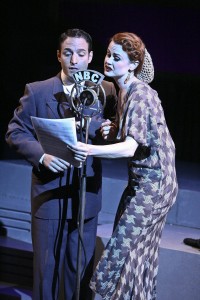 As Doc, Jeffrey Landman sometimes goes a little too Boys in the Band. He’s swishy in a way that doesn’t feel of a piece with the material. It’s also unclear, both in the writing and the playing, why he would so willingly aid and abet his star client to immolation.
As Doc, Jeffrey Landman sometimes goes a little too Boys in the Band. He’s swishy in a way that doesn’t feel of a piece with the material. It’s also unclear, both in the writing and the playing, why he would so willingly aid and abet his star client to immolation.
Then there is the music. Director Jim Fall and Musical Director Keith Harrison bring unexpected magic to the already magical—a neat trick. The arrangements are gorgeous and inventive, and Fall directs with a real eye and ear for what feels authentic for the period, as well as for what feels emotionally grounded.
The set design by Jeff McLaughlin is limited by budget and space considerations, and there is little room for choreographer Lisa Hopkins to bring much to the party. Dianne K. Graebner’s costumes are superbly well-suited to the show, giving the impression of traversing three decades (the 20s to the 40s) that had very different clothing styles. Drew Dalzell does fine work with his sound design, blending the voices and music skillfully; and Sohail e. Najafi’s lighting is expert and focused.
The show runs a brisk 90 minutes. I’d like to see it broadened and given some more naturalistic touches. And much as I appreciate Megan Moran’s multiple personalities, a larger cast might give a chance for some of the musical numbers to look as fantastic as they sound.
photos by Michael Lamont
Falling for Make Believe
Colony Theatre in Burbank
ends on May 19, 2013 EXTENDED to June 30, 2013
for tickets, call 818.558.7000 ext. 15 or visit Colony
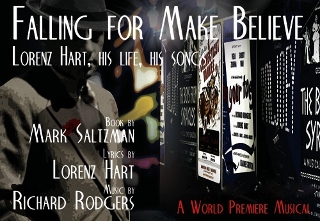
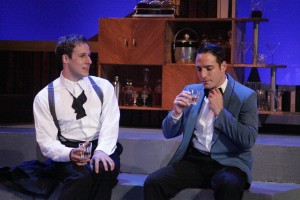
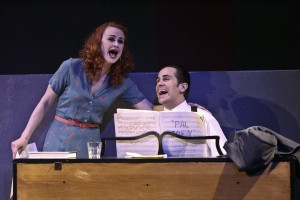
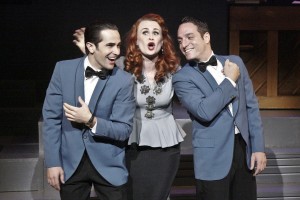
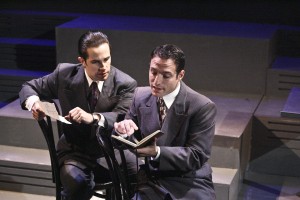

{ 1 comment… read it below or add one }
Rebecca Johnson needs a bigger and better agent. She is a fantastic singer and gets lost in her many TV guest roles. She could and should be on Broadway. Her voice and delivery on these standards is superior to those on record labels (there was no one among the Tony competitors that I saw as her equal). The book and other performers in “Falling for Make Believe” were great, but overshadowed by Rebecca’s talent and personality. It’s a shame that the New York theater community neglects to feature her on its stages.